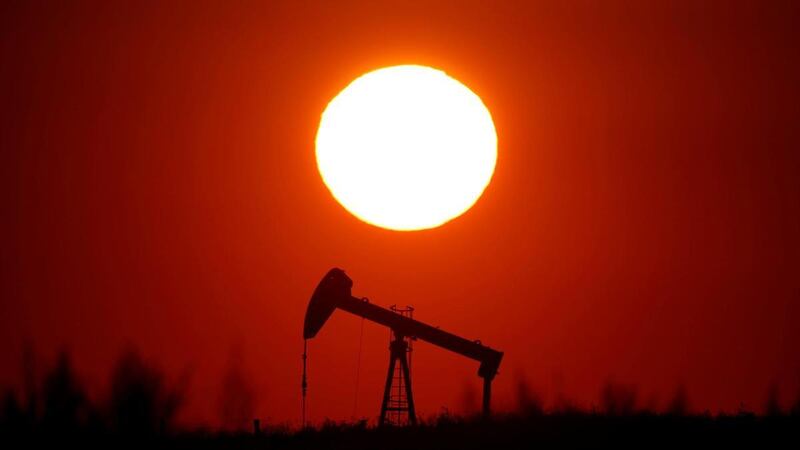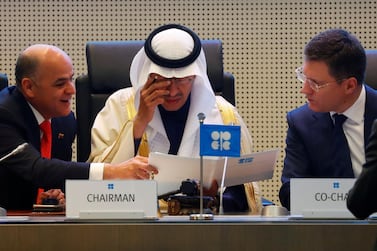Oil reached a 12-week high after Opec and allies pledged to make additional cuts next year, with Saudi Arabia volunteering deeper production restrictions.
Brent was trading a little lower down 1 per cent at $63.71 per barrel at 6.05pm on Monday, while West Texas Intermediate was down 1.3 per cent at $58.43 per barrel.
Last week at Opec's annual summit in Vienna the group and its allies pledged to cut 2.1 million barrels per day from global oil markets from January next year, deepening their current restrictions as they look to rebalance oil markets. Opec is responsible for about 30 per cent of global production.
The alliance first agreed to begin production cuts in 2017 and last week agreed to deepen existing cuts of 1.2 million bpd by an additional 500,000 bpd. In addition, Saudi Arabia and other producers will make "additional voluntary adjustments" of around 400,000 bpd, raising the overall draw from the markets to 2.1 million bpd.
Saudi Arabia, the world's largest oil exporter, and Gulf allies including the UAE have been cutting above their required quotas as they look to counter high global inventories. The kingdom will continue to produce at 9.7 million bpd, with Gulf allies UAE, Kuwait and Russia also pledging additional curbs of 60,000 bpd, 55,000 bpd and 70,000 bpd respectively.
Russia, which had been reluctant to extend cuts further than the first quarter of next year, managed to exclude condensate volumes from its output quota. Condensate refers to a light oil associated with gas production. Moscow will keep cuts at 228,000 bpd from January.
Bank of America Merill Lynch forecasts Brent reaching $70 per barrel before the second quarter of 2020 as global inventories are lowered due to the action taken to cut supply.
"Opec members signalled their intention to prevent stock builds during [the first quarter], which is a seasonally weak period for demand. We forecast a surplus of 700,000 bpd in Q1 and in an optimistic scenario, where Opec members of the agreement meet the agreed targets, inventory builds are reduced by 200,000 bpd," the bank said.
Saudi Arabia, which has been nudging its less-compliant allies such as Iraq to adhere to the pact will look to boost its own output following the inventory draw in the first quarter, the report added.
"Strong compliance, coupled with other positive economic developments, such as a pick-up in global inventory restocking and a small US-China trade deal, could push Brent to our $70 price target ahead of schedule," it said.
Meanwhile, JBC Energy noted that Opec's latest agreement could not be interpreted as something that "effectively changes the oil balance".
"[It is] an effort to distribute the Saudi over-compliance that has been in place since about April to other Opec+ members," the consultancy said.
The Opec agreement is likely to increase uncertainty in the market, leaving a lot of room for speculation, in spite of the bullish surprise from the Saudi delegation at the meeting.
"The key take-away thus far is that a formalised agreement until only March 2020 doesn't do much to help the market price its perspectives beyond that point," JBC said.
The fall back in prices since the 12-week highs were hit suggest some scepticism that the recent upward momentum will continue, as traders continue to wait for news on a US-China trade deal, according to London Capital Group's head of research, Jasper Lawler.
"For WTI to be above $60 at the end of the week, we’ll need at the very least, an extension to the US tariffs deadline. In the context of typical oil market volatility, we thought the post-OPEC gains were rather constrained. That would suggest if we can get through December 15 without more US tariffs on China, there is still some pent up speculative demand for oil."
Opec and allies next convene for their summer gathering in the Austrian capital on 10 June.








